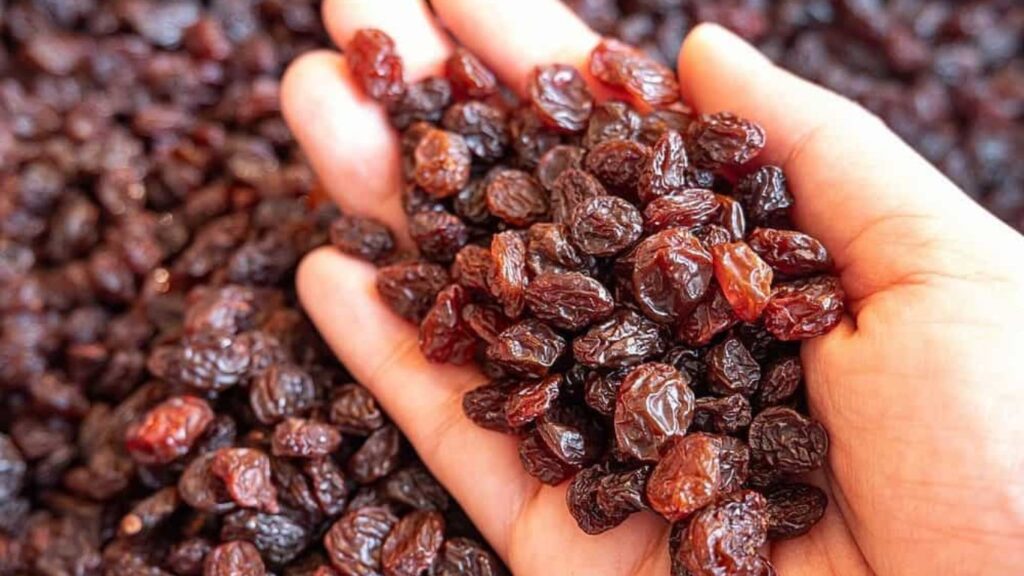When it comes to weight management, we’re often flooded with advice on what to eat, what to avoid, and how specific foods impact our weight. Raisins, those tiny, dried grapes, often spark debate—are they good for weight loss, or do they hinder progress? Given their sweet taste and concentrated natural sugars, some people might assume raisins aren’t ideal for a weight-conscious diet. However, raisins bring several nutritional benefits that can support weight management when consumed mindfully. In this blog, we’ll explore common myths and facts about raisins in relation to weight management, and how you can incorporate them into a balanced diet for achieving your health goals.
The Role of Raisins in Weight Management: Myths vs. Facts
- Myth #1: Raisins are High in Calories and Should Be Avoided in Weight Loss Diets
- Myth #2: Raisins Are Full of Sugar and Should Be Avoided on a Diet
- Myth #3: Raisins Lead to Weight Gain
- Myth #4: Raisins Have No Role in Boosting Metabolism
- Myth #5: Raisins Are Only Good as a Snack and Have Limited Versatility
- The Nutritional Benefits of Raisins for Weight Management
- Final Thoughts: How to Include Raisins in Your Weight Management Plan
Myth #1: Raisins are High in Calories and Should Be Avoided in Weight Loss Diets
Fact: Raisins are Calorie-Dense, but Portion Control is Key
It’s true that raisins are calorie-dense compared to fresh fruit because they’re dried, and the water content has been removed. A small handful of raisins (about 1 ounce or 28 grams) contains roughly 85-100 calories. This might seem high for a small portion, but it’s important to remember that portion control plays a crucial role in weight management.
Raisins offer an excellent source of nutrients in a small, convenient package. Instead of avoiding them altogether, it’s best to consume them in moderation. A small serving of raisins can satisfy a sweet craving without the need for processed sugars, making them a much healthier alternative to sugary snacks and desserts that can derail your weight loss efforts.
Myth #2: Raisins Are Full of Sugar and Should Be Avoided on a Diet
Fact: Raisins Contain Natural Sugars, But They Have Other Nutrients to Balance Them Out

Yes, raisins are high in sugar—around 18-22 grams per ounce—but this sugar is natural and comes along with dietary fiber, vitamins, and minerals. The sugars in raisins are not the same as added sugars found in processed snacks and candies. Natural sugars from whole foods like raisins are metabolized differently in the body, especially when combined with fiber, which helps slow down digestion and prevent rapid spikes in blood sugar levels.
The fiber in raisins (about 1-2 grams per ounce) helps to moderate the absorption of sugar and can keep you feeling full longer. This satiety factor can help curb overeating and snacking between meals, ultimately aiding in weight management.
Myth #3: Raisins Lead to Weight Gain
Fact: Raisins Can Support Weight Loss When Eaten Mindfully
Like any food, overeating raisins can lead to excess calorie consumption, which might contribute to weight gain. However, when eaten in appropriate portions, raisins can actually help with weight loss. The fiber content in raisins promotes a feeling of fullness, preventing you from consuming excessive amounts of calories throughout the day.
Additionally, raisins are a great source of energy, making them an excellent pre-workout snack. Their natural sugars provide a quick energy boost that can power you through your workouts, helping you burn more calories and support your overall weight loss efforts.
Myth #4: Raisins Have No Role in Boosting Metabolism
Fact: Raisins Contain Nutrients That Support Metabolism
Raisins contain several essential nutrients that play a role in supporting metabolism and energy production. They are rich in iron, which is crucial for maintaining healthy energy levels. Iron helps carry oxygen to the muscles and organs, which is vital for efficient metabolism and calorie burning.
Furthermore, raisins are high in B vitamins, including B6 and niacin, which are essential for converting food into energy. A well-functioning metabolism is key to maintaining a healthy weight, and raisins provide the nutrients needed to support this process.
Myth #5: Raisins Are Only Good as a Snack and Have Limited Versatility
Fact: Raisins Can Be Incorporated into Various Meals to Aid Weight Management
Raisins are much more versatile than many people think. While they’re a convenient snack, they can be incorporated into a variety of meals that support weight management. Here are some ways to include raisins in a balanced diet:
- Salads: Add a handful of raisins to your salads for a burst of sweetness. They pair well with leafy greens, nuts, and vinaigrettes, creating a healthy, satisfying meal.
- Oatmeal: Sprinkle raisins over your morning oatmeal or yogurt for natural sweetness without needing sugar.
- Trail Mix: Create a healthy trail mix with raisins, nuts, and seeds for a nutrient-dense snack that’s perfect for keeping hunger at bay.
- Smoothies: Blend raisins into your smoothies for an extra dose of fiber and natural sweetness.
- Whole-Grain Dishes: Add raisins to brown rice, quinoa, or couscous dishes to enhance both flavor and nutritional value.
The Nutritional Benefits of Raisins for Weight Management
Raisins contain several nutrients that make them beneficial for weight management:

- Dietary Fiber: The fiber content in raisins promotes satiety and supports digestion, helping to prevent overeating and regulate bowel movements.
- Natural Sugars: The natural sugars in raisins provide a quick energy source, perfect for maintaining stamina during exercise and throughout the day.
- Antioxidants: Raisins are rich in polyphenols, which have been shown to reduce inflammation and promote overall health, which is crucial for maintaining a healthy weight.
- Micronutrients: Raisins provide potassium, iron, and B vitamins, which are essential for muscle function, energy production, and overall metabolic health.
Final Thoughts: How to Include Raisins in Your Weight Management Plan
Raisins are not the enemy when it comes to weight management. In fact, they can be a beneficial part of a balanced diet when eaten in moderation. The key is portion control and mindful consumption. Raisins can provide a natural, healthy way to satisfy sweet cravings, boost energy, and support digestion—all factors that play a role in maintaining a healthy weight.
By understanding the myths and facts surrounding raisins, you can confidently include them in your weight management plan and enjoy their numerous health benefits without worry. Just remember, as with all foods, moderation is key, and when consumed mindfully, raisins can be a valuable ally in achieving your health and fitness goals.
Also read: Running for Weight Loss: Tips to Maximize Your Results
